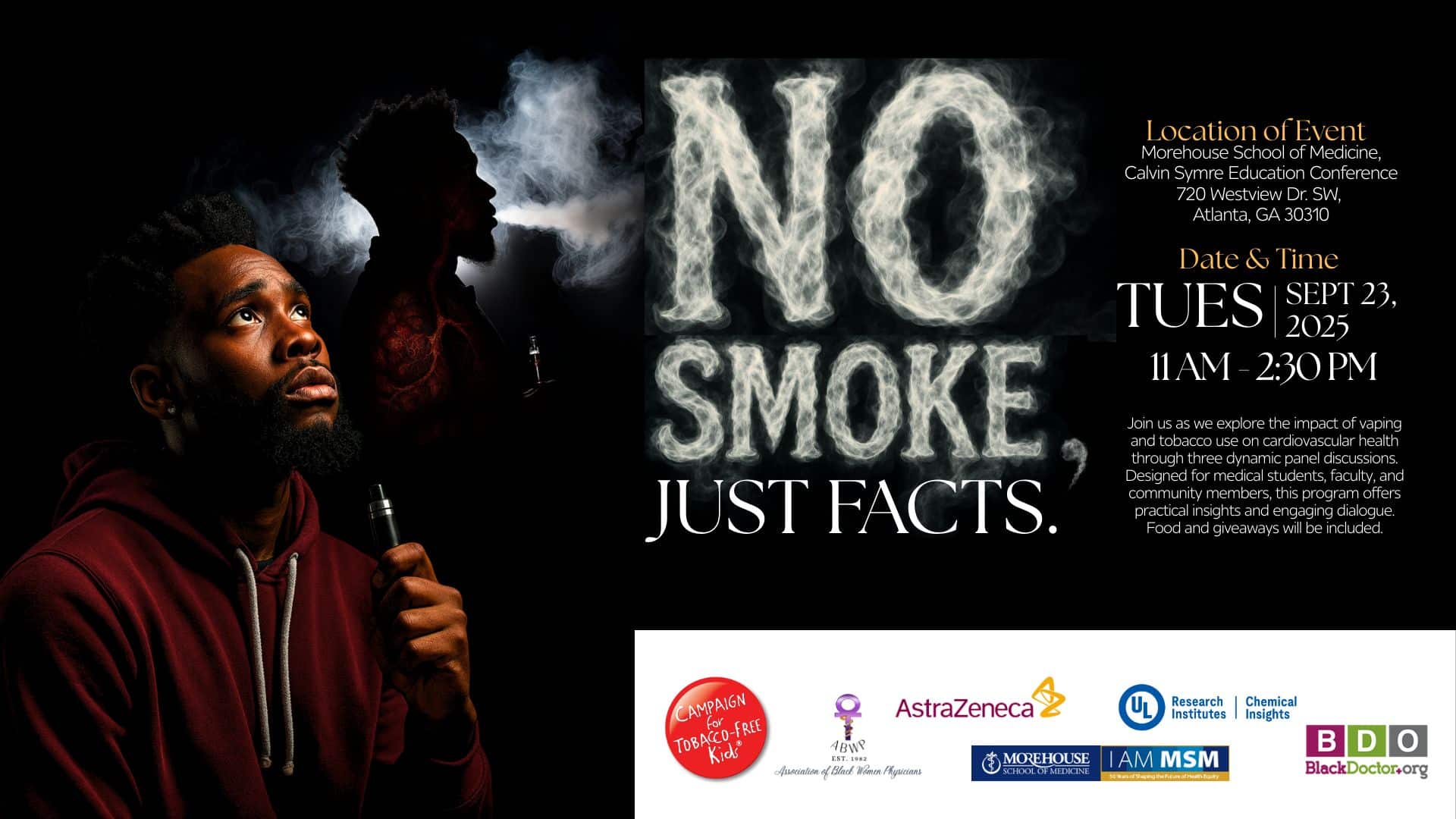
On Tuesday, September 24, BlackDoctor partnered with Morehouse School of Medicine to host No Smoke, Just Facts, a powerful half-day event focused on the history of tobacco, the rise of vaping, and the urgent fight against lung cancer in Black communities.
Held at the Calvin Symre Education Conference Center in Atlanta, the event brought together medical students, faculty, health professionals, and community advocates for three dynamic panel discussions, an engaging Q&A, and a healthy lunch and networking session. The atmosphere was equal parts educational and energizing—reminding everyone in the room that tackling tobacco and vaping isn’t just about health, but also about culture, equity, and justice.
Setting the Stage
Dr. Ashanti Carter, Chief Academic Liaison for BlackDoctor.org, opened with a reminder that tobacco’s story is deeply woven into America’s history—from its role as a cash crop during slavery to the way it has been marketed in Black neighborhoods for generations. “This conversation is about more than cigarettes or vaping pods,” she said. “It’s about reclaiming our health and our communities.”
Panel 1: The Culture & the Cloud—Tobacco, Truth, and Us
Moderator: Dr. Ashanti Carter
Panelists: Dr. Gregory Bolden
Dr. Bolden traced tobacco’s path from sacred Indigenous plant to economic driver of slavery, highlighting how menthol cigarettes were later marketed as “cool” and culturally connected to Black life. He explained how giveaways, sponsorships, and targeted advertising hooked generations of Black smokers.
“Smokers are not our enemy,” Dr. Bolden reminded the audience. “Our fight is with the tobacco industry that has targeted us for decades.”
Panel 2: Breathe In, Tune In—What Science Says About Vaping & E-Cigs
Moderator: Dr. Rakale Quarells, Morehouse School of Medicine
Panelists: Dr. Sheila Young-Mercado, Dr. Christa Wright
The conversation shifted to vaping, which is often misbranded as a safer alternative to cigarettes. Experts broke down the science: vaping exposes the lungs and cardiovascular system to harmful chemicals, increases nicotine addiction, and is especially dangerous for young people.
Panelists also drew parallels between menthol marketing in the 20th century and today’s youth-targeted vaping ads. “We’re seeing elementary school students vaping,” Dr. Young-Mercado warned, calling for stronger prevention and culturally competent education.
Panel 3: Community Voices Against Lung Cancer—It’s Not Only Smoke
Moderator: Kristin Vaughan, Chief Content Officer, BlackDoctor.org
Panelists: Kerri Gober, Dr. Eugene Manley, Jr.
The final panel tackled lung cancer, challenging the perception that it’s “only a smoker’s disease.” Panelists emphasized other risk factors like radon exposure, environmental hazards, and genetics, while also addressing the stigma lung cancer patients face.
Dr. Manley spoke to the promise of early detection and new treatments, while Gober stressed the importance of changing the narrative around lung cancer in Black and Brown communities. “This is not just a health issue—it’s a social justice issue,” Vaughan said in closing.
Audience Voices & Collaboration
During Q&A, community advocates asked how to strengthen partnerships between Morehouse, BDO, and organizations like the Heart Coalition. Others raised the role of influencers and social media in shaping perceptions around vaping and tobacco use. The conversation underscored the need for grassroots action, accurate information, and ongoing collaboration.
Beyond the Panels
The event closed with a healthy lunch, networking, and physical activity, reinforcing the day’s themes of prevention and wellness. Exhibitors shared cessation resources and wellness tools, ensuring attendees left not just informed, but equipped to take action.
Key Takeaways
-
History matters: Tobacco’s ties to slavery and systemic marketing explain current disparities.
-
Menthol is a justice issue: 85–90% of Black smokers use menthol—by design, not chance.
-
Science is clear: Vaping and hookah carry real risks; youth prevention is urgent.
-
Lung cancer ≠ smoking only: Environmental and social factors play a major role.
-
Change starts local: Grassroots organizing, culturally rooted education, and strong partnerships are essential.
Looking Ahead
No Smoke, Just Facts was more than a discussion—it was a call to action. By centering history, science, and community voices, the event reminded everyone that the fight against tobacco and lung cancer in Black communities is ongoing, and together, winnable.









